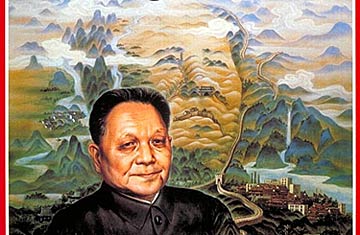
(2 of 20)
The Zhongyang was all there on the Hill that first night: Mao himself; his wife Jiang Qing; Chou Enlai; Chu Teh; Peng Dehuai; Liu Shaoqi; the band of comrades who had shaken not only China but the world, comrades whose devotion to one another gave victory to their revolution. After which they murdered one another, tortured one another, tried to assassinate one another, imprisoned and humiliated one another.
Mao, of course, was the greatest name; he went on into Peking and became God — but also, with almost no doubt, insane. Jiang Qing, a bitch killer and one of the great dragon ladies of Chinese history, now languishes under life sentence in jail. Peng Dehuai, a superlative military leader who had fought side by side with Mao for 20 years, went on to command the front against the Americans in the Korean War and later was named Minister of Defense. But he became the first openly to criticize Mao, and that cost him dearly. He was left to die of cancer in a common hospital ward in Peking, the windows of the ward papered over so he could not see the sun. Liu Shaoqi, named by Mao as President of China, was later dismissed and died in solitary confinement in 1969. Both were posthumously restored to honor in 1981 when they were officially recorded as having been "persecuted to death." They had been brothers in the faith of Mao-Marx-Lenin. But history held truths that overrode Marxism-Leninism as, for example, that suffering is a bond, but power is a drug. And once power was in their hands, the drug addled their minds and together they brought China to the threshold of ruin.
So one must begin the story of China now in 1983 with what happened once the revolutionaries came down from the slope of Fragrant Hill in 1949.
MAOISM: THE
BLOODY SPIKE
Their problem was immensely complicated: How does an army make a government? Armies and generals are not particularly good at governing, and the problem of governing China has always been one to numb the mind. But in 1949 the army, its generals,its tough and cruel party, thought it would be simple.
The key to the problem, as the revolutionary armies and the party saw it in 1949, was Mao's thinking. "Mao Thought" should not be considered simply a dogma, or a slogan, least of all a coherent doctrine. It should be thought of as a spike, driven by the will of one man into the minds of his people, to nail them to his purpose. But in the next 25 years the spike was driven through the living flesh of people until they bled, or hungered, or died at random, until life became chaos. The spike had to be torn out or half China's people would perish. What is going on in China now is a great debate over whether to rip Mao Tse-tung entirely out of history, or whether to let what is left embedded of "Mao Thought" heal over.
Of all this I learned nothing that first night. I learned only later that Wang Bingnan (a hero of the revolution for arranging the Christmas 1936 kidnaping of Chiang Kaishek, later China's senior diplomat in the West) had himself been purged during the Cultural
